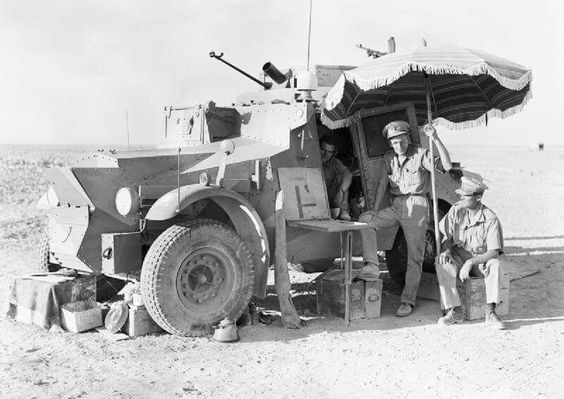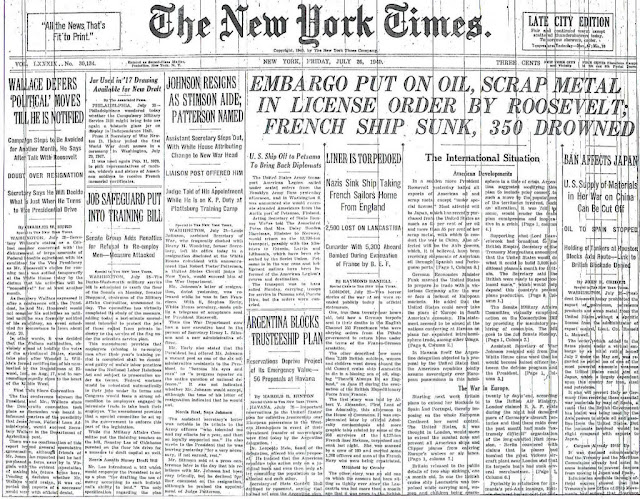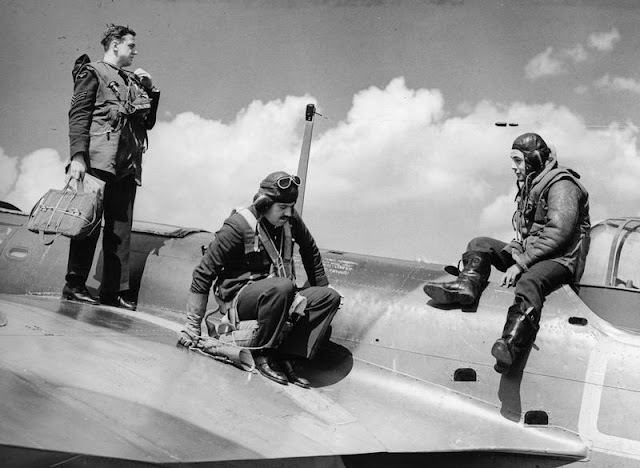Thursday 13 February 1941
 |
| "Two members of the 'Shitfa' - Abyssinian patriots - with rifles, Kenya, 13 February 1941." © IWM (E 1959). |
The Greek I and II Corps are combined into Epirus Army. Western Macedonia Army controls units to the north.
Australian Prime Minister Robert Menzies, having broken his journey from Melbourne to London in Cairo, meets with British Middle East Commander General Archibald Wavell. Menzies observes (in his diary) that the general is "clearly contemplating the possibility of a Salonika (Greece) expedition." This seems to be news to Menzies of at most casual interest as if Wavell has mentioned it only as side operation, not a major strategic initiative.
The implication is that Menzies - the national leader of the Australian troops now carrying the brunt of the fighting during Operation Compass - has been kept "out of the loop" on the wrangling about whether to send Middle East troops to Greece. Such moves are imminent, and RAF units already are being switched to Athens. This seems like something that the Prime Minister of Australia should be kept informed about, given that his troops are directly affected. However, it is the only reference in Menzies' entire diary about discussions with Wavell regarding any such "expedition."
East African Campaign: Operation Composition begins. Fourteen Fairey Albacore from HMS Formidable sink 5723-ton Italian freighter Monacalieri at Massawa in Italian East Africa. They also cause minor damage to several other ships. The RAF loses two Albacores, the six aircrew becoming POWs.
This is the first of several raids, the second on 21 February and the third on 1 March, all usually lumped under the "Operation Composition" codename (which technically only applies to this raid). HMS Formidable is en route from Vice Admiral R. Leatham's East Indies Fleet to Alexandria to replace the damaged HMS Illustrious, but the crew has time on its hands because the Suez Canal remains closed due to Luftwaffe mining.
Separately, aircraft from HMS Eagle torpedoed and damaged 590-ton German freighter Askari, one of the ships fleeing from the advancing British in Italian Somaliland, on the 12th. The crew managed to get the Askari back to Kismayo and beach it today, but the ship is written off. The Eagle's aircraft also combine with heavy cruiser HMS Hawkins and HMS Shropshire to sink 6268-ton Italian freighter Pensilvania. Just like Askari, Pensilvania is hit off Mogadishu, beached, and declared a total loss and broken up. Italian freighters Erminia Mazzella, Manon and Savoia, other refugees from Kismayu, also are captured.
At Keren, Eritrea, Lieutenant-General William Platt decides to pause his Indian troops' attacks on the Italian troops defending Dongolaas Gorge. He reduces his troop count in order to ease the supply situation by sending the 5th Indian Division back to the railhead at Kessala. The British begin assembling troops on all sides of Keren. It will take some time, however, for other forces to assemble and threaten Keren from the rear. Undeniably this has been an Italian defensive victory, but all it promises to do is buy some time, not stop the British offensive rolling through East Africa.
British advances continue elsewhere without too much hindrance from the Italians. Bulo Erillo, Somalia (south of Mogadishu) falls to the Gold Coast 24th Infantry Brigade.
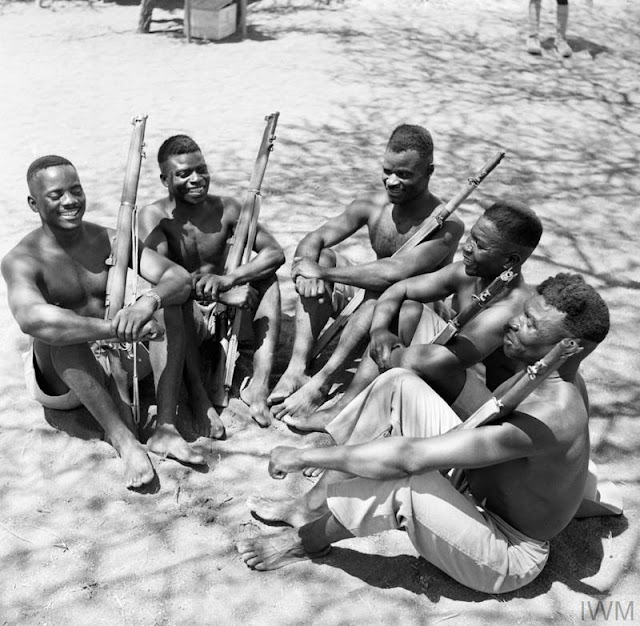 |
| "Soldiers of the King's African Rifles (KAR) during the British advance into Italian Somaliland, 13 February 1941." © IWM (E 1968). |
Battle of the Atlantic: U-96 (Kptlt. Heinrich Lehmann-Willenbrock) is stalking Convoy HX 106 and spots a straggler. Lehmann-Willenbrock torpedoes 7987-ton British freighter Clea at about 15:00. A single torpedo snaps the freighter in two, but they remain afloat. U-96 surfaces and gets in some artillery practice on the two hulks, sinking them.
U-103 (Kptlt. Viktor Schütze) also finds a straggler of Convoy HX 106 in the shipping lanes south of Iceland. It is 10,516-ton tanker Arthur F. Corwin, and Schütze puts some torpedoes into it. Tankers, however, are difficult to sink due to their compartmentalized construction and does not sink. However, it is on fire and trailing heavy plumes of smoke.
U-96, perhaps attracted by the smoke from the burning tanker, comes across the Corwin later in the day. The tanker is still under power, but has fallen further behind its convoy. Lehmann-Willenbrock puts two more torpedoes into the tanker, which is a burning wreck. This does the trick, sending the ship to the bottom. All 59 men on board perish. The HX 106 convoy escorts come back to investigate and spot U-96 later, attacking it without success.
The Luftwaffe (I,/KG 40) bombs and sinks 320-ton anti-submarine trawler HMT Rubens. Rubens is an escort of convoy OG 52, but through a misunderstood signal has separated from the convoy. All 21 onboard perish.
The Luftwaffe attacks Glasgow. Along with shoreside damage, the destroyer HMS Anthony receives some minor splinter damage from exploding bombs on the docks.
The Luftwaffe bombs and damages 1900-ton British freighter Westcliffe Hall near the Whitby High Light. The ship's steering gear is damaged, but the crew manages to get the ship to the River Tees.
The Luftwaffe damages 4512-ton British freighter Cape Rodney off Girdle Ness, Aberdeen.
Royal Navy destroyer HMS Ripley collides with the fellow destroyer HMS Burwell and anti-submarine trawler HMS Notre Dame de France while they are at sea-trials. These are all destroyers acquired under the destroyers-for-bases deal of September 1940. The damage is moderate, and Ripley sets off for three weeks of repair at Devonport.
Convoy OB 286 departs from Liverpool, Convoy HX 109 departs from Halifax.
Royal Navy corvette HMS Alisma (K 185, Lt. Commander Maurice G. Rose) is commissioned and boom defense vessel HMS Barrymore is launched.
U-557 (Oberleutnant zur See Ottokar Paulshen) is commissioned and is assigned to U-boat Flo1, based at Kiel.
The Luftwaffe continues planting magnetic mines in Benghazi harbor. The Royal Navy, however, has opened the port for convoys despite numerous sinkings at Tobruk from such mines.
Chief of the Air Staff Air Chief Marshal Charles Portal telegrams Commander-in-Chief Arthur Longmore of the RAF's Middle East Command. Portal directs Longmore to render "such immediate help as [he is] able." Portal specifically mentions transferring a Wellington bomber unit, RAF No. 33 Squadron, to Athens. Longmore is unenthusiastic about sending units to Greece, and in fact, believes that more RAF units are needed in Egypt and Libya. However, Prime Minister Winston Churchill is adamant about transferring units to Greece as soon as possible. Portal is courteous, but he makes it plain that Longmore had better not drag his feet, saying that he would be "glad to hear...what immediate help [you can] send."
Many in the British Middle East Command are quite upset about the halt of operations imposed by Whitehall on the 12th. Admiral Cunningham notes that he is "most bitterly disappointed at the turn this Libya campaign has taken." He takes some comfort from the fact that "I know it was not due to any naval shortcomings (we had just landed just landed 2,500 tons of petrol and over 3,000 tons of other stores at Benghazi and had doubled the amount we had guaranteed to land daily at Tobruk)." In light of later events, it is instructive to see that commanders at the time viewed the diversion of resources away from a continuing victorious campaign in Libya as questionable. It is fair to point out that the British military leadership in both London and Egypt uniformly wish to continue Operation Compass all the way to Tripoli.
The Luftwaffe attacks Malta multiple times throughout the day. The attacks are spread out across the island. A Wellington and a Whitley bomber are damaged during the attacks, and three bombs apparently intended for Ta Qali airfield fall on Imtarfa Hospital, killing three patients, seriously wounding six, and lightly wounding another six. Many of the patients are military personnel.
Battle of the Pacific: The Marine 3rd Defense Battalion completes its move to Midway Island aboard three cruisers and a store issue ship.
Vichy French/Spanish Relations: After winding up his talks with Mussolini (Italy), General Franco (Spain) meets Petain (Vichy France) at Montpellier. The three nations basically have nothing whatsoever in common, but Hitler has high hopes that the three dictators will find some kind of common ground in fighting the British.
German/Vichy French Relations: The Germans have gotten wind of Marshal Petain's backdoor negotiations with the British. In no uncertain terms, the Germans tell the French to stop it.
German/Italian Relations: Grand Admiral Erich Raeder meets with his Italian counterpart, Admiral Arturo Riccardi, at Merano. They discuss naval cooperation in the Mediterranean, a matter of urgency due to the new Afrika Korps in Libya. Shipping from Naples to Tripoli will be a major determinant in the limits of General Erwin Rommel's success in North Africa.
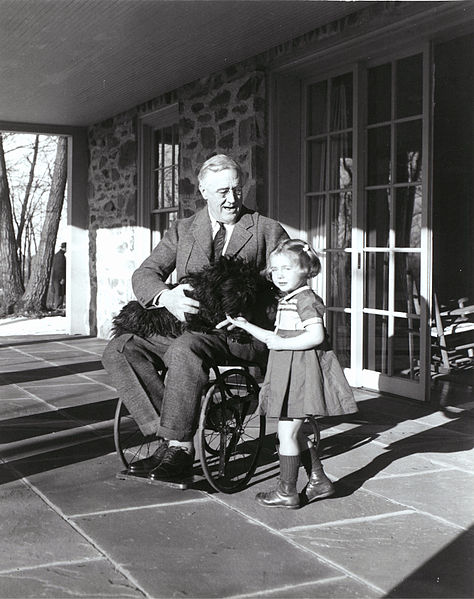 |
| Franklin Delano Roosevelt on the porch at Top Cottage in Hyde Park, NY, February 1941. With him is Ruthie Bie and Fala (FDR Presidential Library & Museum photograph by Margaret "Daisy" Suckley). |
Anglo/Bulgarian Relations: The British recently have broken off relations with Romania due to the presence of German troops there. Today, the British warn the Bulgarians that the same could happen to them if the same circumstances arise. The British minister in Sofia, George Rendel, states:
If the Germans occupy Bulgaria and make it a base against our ally, obviously we shall have to break off relations with Bulgaria and take whatever measures the situation requires.British Military: Continuing his extreme skepticism about the necessity to maintain a large force in North Africa, Churchill memos General Ismay about a convoy being formed, of whose composition he writes "I do not approve." This is a continuation of Churchill's outspoken concern about the "tooth to tail" ratio in the Middle East Command, which he implies repeatedly at this stage of the war is full of unnecessary useless mouths. He points out specific units being carried in the convoy (apparently a Winston Special convoy, though it is not identified in the memo) that he views as "non-combatants" due to lack of equipment and thus dead weight. Churchill proposes sending fewer troops in such convoys and more equipment, given that there are troops already on the ground in Egypt that are at loose ends due to lack of equipment.
Soviet Military: General Nikolai Vatutin becomes Deputy Chief of the General Staff (Stavka).
US Military: American Samoa Governor Captain Laurence Wild recommends:
the establishment of a Native Insular Force separate and distinct from the Fita Fita Guard, which was to function under and to be paid by the Government of American Samoa.The issue of US commitment to overseas bases in the Pacific is quite controversial in congress. Some feel that they should be built up, others that they are indefensible. In this case, the suggestions lead to the establishment of the First Samoan Battalion, U.S. Marine Corps Reserve.
Indochina: The Japanese "show the flag" operation (Operation S) continues. Having visited Bangkok, heavy cruisers IJN Suzuya, IJN Mikuma, IJN Mogami, and IJN Kumano visit Saigon. The Japanese are currently mediating talks between the French and Thais to close out their border war, and this show of force is designed to move the French toward making concessions.
Italian Homefront: The Italians have worked extremely quickly to repair the damage to the aqueduct on the Tragino River caused during Operation Colossus on 11 February. Today, the aqueduct goes back in service. Throughout World War II, the British will obsess about attacking dams and other water infrastructure, with extremely mixed results.
Dutch Homefront: Unrest in Amsterdam continues. The German occupation forces in Amsterdam complete their closure of the Jewish Quarter with barbed wire, barring it to all gentiles. Checkpoints are in place so that nobody goes in or out without permission.
 |
| A train (569 Armstrong) in British Columbia, 13 February 1941. |
February 1941
February 1, 1941: US Military Reorganization
February 2, 1941: Wehrmacht Supermen
February 3, 1941: World Will Hold Its Breath
February 4, 1941: USO Forms
February 5, 1941: Hitler Thanks Irish Woman
February 6, 1941: Operation Sunflower
February 7, 1941: Fox Killed in the Open
February 8, 1941: Lend Lease Passes House
February 9, 1941: Give Us The Tools
February 10, 1941: Operation Colossus
February 11, 1941: Afrika Korps
February 12, 1941: Rommel in Africa
February 13, 1941: Operation Composition
February 14, 1941: Nomura in Washington
February 15, 1941: Churchill's Warning
February 16, 1941: Operation Adolphus
February 17, 1941: Invade Ireland?
February 18, 1941: Panzerwaffe Upgrade
February 19, 1941: Three Nights Blitz
February 20, 1941: Prien's Farewell
February 21, 1941: Swansea Blitz Ends
February 22, 1941: Amsterdam Pogrom
February 23, 1941: OB-288 Convoy Destruction
February 24, 1941: Okuda Spies
February 25, 1941: Mogadishu Taken
February 26, 1941: OB-290 Convoy Destruction
February 27, 1941: Operation Abstention
February 28, 1941: Ariets Warns Stalin
2020


